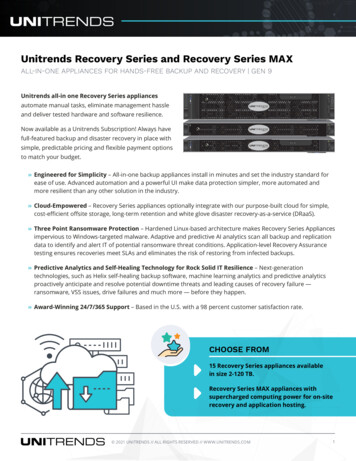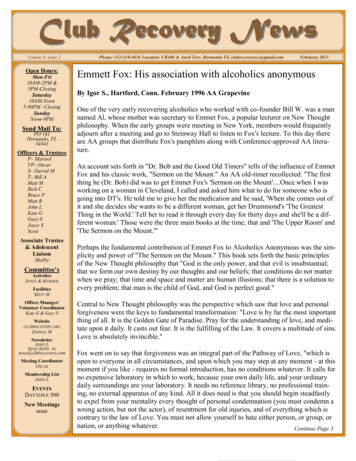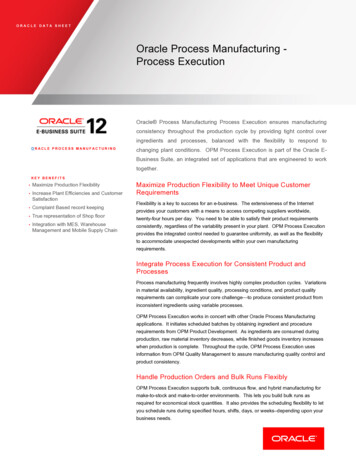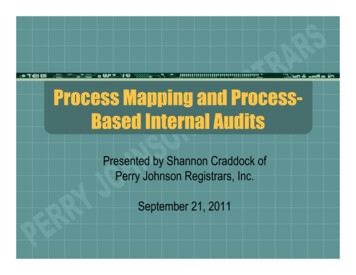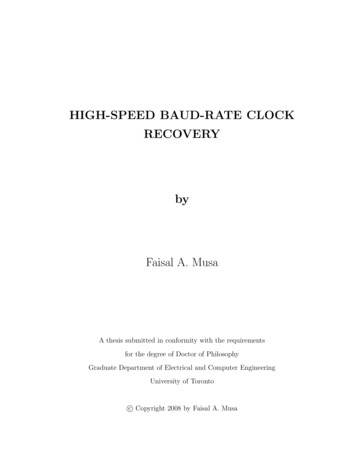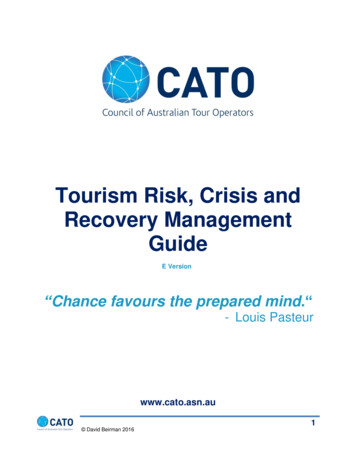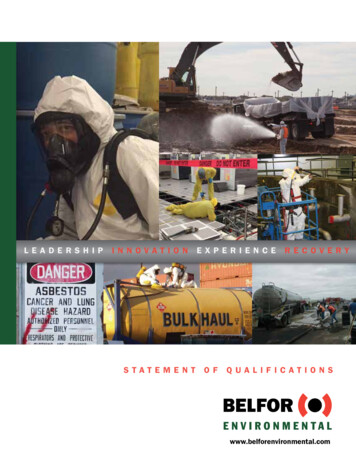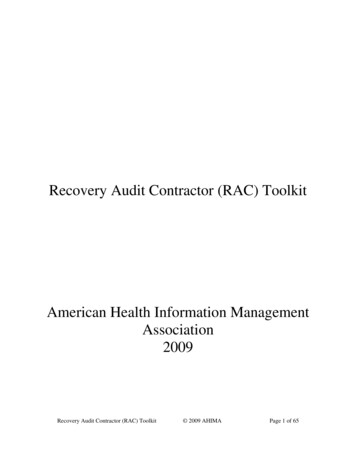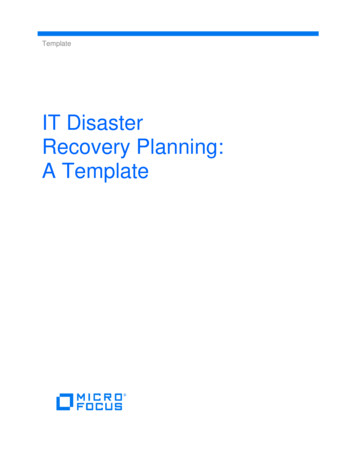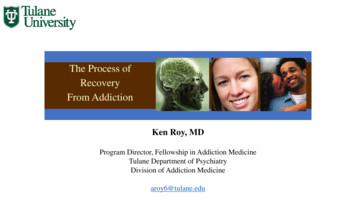
Transcription
The Process ofRecoveryFrom AddictionKen Roy, MDProgram Director, Fellowship in Addiction MedicineTulane Department of PsychiatryDivision of Addiction Medicinearoy6@tulane.edu
Like Minded Docwww.likemindeddocs.org
Treatment is Long Term – Life Long Detoxification is NOT treatment for addiction It is a prerequisite Addictionectomy is NOT possible Initial intense treatment should transition to less frequent ongoing treatment Treatment is best concurrent with 12-Step membership, attendance andpractice Get a sponsor, read the Big Book, go to meetings and work the steps Or, find another way to harness pleasure drives in the service of some higher purpose People and families change at depth in treatment and recovery But very slowly
What we have to work with Genetic predisposition at birth Potential addict Parenting and early life Traumatized potential addict Use beginning in adolescence Immature, traumatized potential addict Regular use Neuroadapted, immature, traumatized addict
Neuroadaptation Occurs in the brain The altered brain thinks, believes, feels and directs behavior in an alteredway Stinking thinking A way of being/thinking characterized by self centeredness, external locus of control, loss ofempathy and loss of spiritual connectedness Stinking thinking resolves slowly in abstinence Stinking thinking is a predictor of relapse Stinking thinking will resolve in the context of abstinence supported byrecovery
Immaturity Adolescence a horrible, painful process of learning how to feel bad andgood appropriately How to deal with hurt, disappointment, fear, rejection and success Persons with addiction don’t navigate adolescence They modify feelings with ETOH & drugs They remain “stuck” at the age they start drinking/using They don’t mature In recovery the experience of fear, hurt, rejection and success willpredict relapse
Developmental Trauma In the face of trauma - defense mechanisms develop And everyone has trauma These defense mechanisms are “effective” at that time They defend against fear or hurt They include behaviors for avoiding that hurt and fear During adolescence most people modify these To more adult, functional behavior These defense mechanisms will emerge in recovery and predict relapse
Genetic Predisposition Disorders related to this genetic complex: Dependence on carbohydrates, gambling, religion, sex, aggression, stress, certainpersonality disorders, ADHD and novelty seeking. Evidence for a Reward Enhancement Syndrome (RES) Evidence for a Reward Deficiency Syndrome (RDS) All known predictive gene candidates involve impact on the dopamine system Most have significance on interpersonal relationships And patients (and all people) need to accept themselves People in recovery need to learn how their behavior affects others
What is Recovery From This? Betty Ford definition of recovery: Voluntarily maintained lifestyle characterized by sobriety, personal health andcitizenship ASAM definition of recovery A process of sustained action that addresses the biological, psychological, social andspiritual disturbances inherent in addiction. Recovery aims to improve the quality oflife by seeking balance and healing in all aspects of health and wellness, whileaddressing an individual’s consistent pursuit of abstinence, impairment in behavioralcontrol, dealing with cravings, recognizing problems in one’s behaviors andinterpersonal relationships, and dealing more effectively with emotional responses.
What is Recovery (2) ASAM (cont.) An individual’s recovery actions lead to reversal of negative, self-defeatinginternal processes and behaviors, allowing healing of relationships with selfand others. The concepts of acceptance and surrender are also useful in thisprocess. Since some prescribed and non-prescribed medications can interferewith recovery, it would be prudent to consult with an Addiction SpecialistPhysician in selected cases.
Research Definition or Recovery Lee Ann Kaskutas, DrPH, et. al.J Studies on Alcohol & Drugs. November 2014 Elements That Define Recovery: The Experiential Perspective A list of characteristics that are endorsed by 90% of a group of 9,341responders in long term recovery who said that these “Elements” belonged in adefinition of recovery These Elements can be categorized into five groups AuthenticityEmotional competenceHealthy RelationshipsRight sizing of ego and spiritualityAttention to neuroadaptation
Authenticity Being honest with myself Striving to be consistent with my beliefs and values in activities that take upthe major part of my time & energy Being able to have relationships where I am not using people or being used Dealing with mistakes A realistic appraisal of my abilities & my limitations Taking responsibility for the things I can change
What are the Tasks of Authenticity? Defense against trauma Guardedness - vulnerability Untruthfulness - honesty Cute, angry, demanding, “private,” - real, benign, giving and open Immaturity Avoiding feelings - Open and vulnerable Applicable Step work for participants 6&7
Emotional Competence Being able to enjoy life without drinking or using drugs like I used toHandling negative feelings without using drugs or drinking like I used toChanging the way I think through thingsTaking care of my mental health more than I did beforeBeing able to deal with situations that used to stump meReacting to life’s ups and downs in a more balanced way than I used toHaving tools to find inner peace when I need toDeveloping inner strengthImproved self-esteem
What are the Tasks of EmotionalCompetence Defense against Trauma Guilt and shame - self-acceptance Conditional love - unconditional positive regard Immaturity Repression of feelings - expression of feelings Avoidance of feelings - embrace of feelings as information Applicable Step work for participants 4, 5, 6, 7, 8, 9, 10
Healthy Relationships Being able to have relationships where I am not using people or being used (2) Having people around me who know how to get through life without usingalcohol or other drugs like they used to Getting along with family and friends better than I did before Learning how to get the support from others that I need Helping other people to not drink or use drugs like they used to Not replacing another destructive dependency with another
What are the Tasks toward HealthyRelationships Defense against trauma Conditional love - unconditional positive regardRepression of guilt and shame - intimacyConfusion about boundaries - Learning where I stop and you beginGuardedness - vulnerability Immaturity Intolerance of feelings - embrace of feelings as information Overreacting to feelings - regulation of feelings Fluid commitments - reliability Applicable Step work for participants 4, 5, 6, 7, 8, 9, 10
Right Sizing of Ego and Spirituality A process of growth & developmentLiving a life that contributes to society, to your family, or to your bettermentBeing the kind of person that people can count onBeing gratefulAbout giving back (see b.)Appreciating that I am part of the universe, something bigger than myselfBecoming more open-minded about spirituality than beforeFeeling connected to a spiritual being or force that helps me deal with thedifficulties of life Spiritual in nature and has nothing to do with religion
What are the Tasks of Spirituality Defense against trauma Being the highest authority - accepting a higher authority Self centeredness - concern for the welfare of others Immaturity Indulgence in appetites - moderation of appetites Win-lose behaviors - win-win behaviors Applicable Step work for participants 6, 7, 10, 11, 12
Attention to Neuroadaptation No use of alcoholNo abuse of prescribed medicationsNo use of non-prescribed drugsFreedom from feeling physically sick because of my drinking or usingTrying to live in a place that is not overrun with alcohol or drugsTaking care of my physical health more than I did beforeNo use of tobacco
What are the Tasks of HealingNeuroadaptation Using - not using Seductive people, places and things - change people places and things Go to meetingsMake friends in recoveryAvoid risky environmentsEat wellExercise Applicable Step work 1, 2, 3, 11, 12
How Do You Get from Addiction toRecovery? Address neuroadaptation Structure, emotional support, unconditional positive regard, medications 12-Step recovery or equivalent, shared adversity community Achieve emotional competence and develop healthy relationships Therapeutic Community, Interpersonal Group Psychotherapy, Choose and then learnpersonal responsibility, acquire self-acceptance and commitment to growth Learn right sizing of ego and spirituality 12-Step recovery and spiritually focused elements of treatment group & education Heal developmental trauma Experiential group and individual exercises, Develop Authenticity Work in group and AA/NA on self acceptance, honesty and personal responsibility
Will Medication Help? Medication will stabilize neuroadaptation Medication will help patients feel comfortable enough to participate Medication is not “switching addictions” People on medications for addiction don’t (usually) take more than is helpful People on medications for addiction don’t express the symptoms of addictionaround the medication People who are prescribed medication and not working on recovery sometimes continuethe drug using lifestyle and misuse (sell, inject, trade) the prescribed medication For people with addiction involving the use of opioids the recoveryrate is very low without the use of medications
How to Get Well From Addiction Stop using Change everything about yourself
For a Copy of These Slidesaroy6@Tulane.edu
Stinking thinking A way of being/thinking characterized by self centeredness, external locus of control, loss of empathy and loss of spiritual connectedness Stinking thinking resolves slowly in abstinence Stinking thinking is a predictor of relapse Stinking thinking will r
